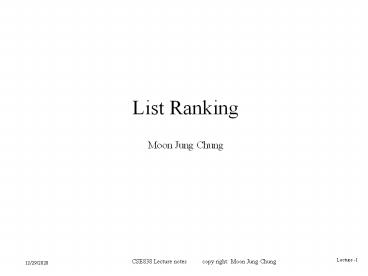List Ranking Moon Jung Chung - PowerPoint PPT Presentation
Title:
List Ranking Moon Jung Chung
Description:
CSE838 Lecture notes copy right: Moon Jung Chung. Lecture -2. Pointer Jumping Review ... work O(nlogn) is not optimal. 9/8/09. CSE838 Lecture notes copy right: ... – PowerPoint PPT presentation
Number of Views:93
Avg rating:3.0/5.0
Title: List Ranking Moon Jung Chung
1
List RankingMoon Jung Chung
2
Pointer Jumping Review
How to compute a prefix on a linked list?
If NEXTi ! NILL then Xi lt- Xi
XNEXTi NEXTi lt- NEXTNEXTi
work O(nlogn) is not optimal
3
Pointer Jumping Review
How to compute a prefix on a linked list?
11
2
7
A node does not not jump if it is jumped
over. How to know to jump or not?
4
Random Pointer Jumping
pointer jump only if female-male
1
4
6
7
A-gtB-gtC is jumped to A-gtC. B is jumped over. No
jump crossing. i.e., A-gt B-gtC and B-gtC-gtD
simultaneously Once a node is jumped over, the
node becomes inactive. In reconstruction phase,
process are activated in reverse order.
5
Random list ranking algorithm
- ranki 1, activei true, t1
- in parallel while nexthead ! nil
- if (activei and nexti! nil)
- sexi random M,F
- if sexi F and sexnexti M
- timenexti t
- activenexti false
- ranki ranki
ranknexti - nexti nextnexti
- t
- for kt down to 1
- if (timei t and nexti ! nil)
- ranki ranki ranknexti
6
complexity of easy random list ranking
- Prob that a cell is not jumped over 3/4
- Probability that a cell is not jumped over after
k-iteration (3/4)k - Pi cell is not not jumped over after k rounds.
- At least one cell is not jumped over after k
rounds - P1 ? P2 ... ? Pn ? P1 P2 ... Pn 1/n(c-1)
if we choose (3/4)k lt 1/nc - So, for (3/4)k lt 1/nc ltgt k clog 4/3n,
- the error that it goes more than clog 4/3n rounds
becomes 0.
7
Random ranking algorithm with O(n/logn) PEs,
O(logn) time
- Shared memory model
- each processor handles logn cell as a queue
- processor only look at the top of the queue
- jump over top i only if jprevi is top.
- Then nexj nexti and remove top from the
queue - Still has memory imbalance
- Each PE can splice out
- Slice_out(i)
- prevnexti previ and nextptevi
nexti - rankprevi rankprevi ranki
- if nexti ! nil then prevnexti previ
8
Algorithm
- Initially
- ranki,k 1, sexi,k F
- topi Qi.1 // Queue of PE is 1st element.
- sexnil M
- t1
- while nexthead ! nil
- if position of topi ? logn
- sextopi randomM,F
- if (sexprevtopi F and sextopi M
- spliceout(topi)
- position of topi points next in the queue
of PE i - splicetimetopi t
- t
- Observation Prob. that a particular queue is not
empty after 16logn rounds is lt 1/n.
9
Optimal Deterministic List Ranking Algorithm
- How to pick 1/4 PEs with guarantee?
- k-Ruling set
- G(V,E) be the directed graph representation of a
linked list L with vertices v1,...,vn. - A subset S of V is a ruling set if
- 1. No two vertices in S are adjacent.
- 2. For each vertex vi in V, there is a directed
path from some vertex in S to vi with length at
most k. - S head of each segment of linked list, k is the
length from the ruler. - If we have a k-ruling set, every time we can
select rulers (n/k elements) without conflict. - Observation k-coloring of a linked list can be
converted into k-ruling set. - How to find k-ruling set?
10
Deterministic Coin Tossing and k-Coloring
11
List Ranking and Ruling Set
- N/logN PEs
- Each PE has logN data
- Each PE has N/logN data
- 1. Find a 6 ruling set
- 2. Apply splice operation for ruling set
- Each iteration
- c(N/logN) top element be eliminated
- C(N/logN) k N , k O(logN)
- Complexity O(logN (logN)logN)
12
New Divide and Conquer Approach
- List-Ranking (A, m)
- 1. If m lt n/logn, apply list ranking with each PE
one node - 2. Find Ruling Set
- 3. Reduce list to A
- 4. List-Ranking(A, m)
- Depth of recursion O(loglogN)
- Complexity logn loglogN































